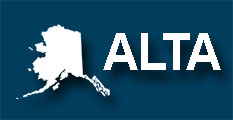
The Alaska Land Title Association is not aware of current legislation which would impact the Title Insurance Industry. The Association is actively involved in researching potential legislative matters and will update this page should any matters arise.
Legislative
Legislation of interest to AK ALTA – 30th Legislature, First Regular Session, Spring 2017
Passed legislation
Enrolled HB80 – Adopting the Municipal Property Assessed Clean Energy Act;
Authorizing municipalities to establish programs to impose assessments for energy improvements in regions designated by municipalities; imposing fees; and providing for an effective date. Read the legislation here.
AK ALTA Note: Property owners must give mortgage lien holders 30 days notice of intention to participate in program and must obtain consent from each mortgage lien holder.
Enrolled SB 100 – Relating to municipal liens; relating to service areas in second class boroughs;
Relating to a municipal tax exemption or deferral for economic development property; relating to a municipal tax exemption for a fire protection system; and providing for an effective date. Read the legislation here.
AK ALTA Note: Liens filed under municipal ordinances/laws are recognized as valid, with same status as liens filed and recognized under state or federal statutes, and are not or can no longer allege to be nonconsensual common law liens.
Pending legislation that did not pass (may be re-introduced in Second Regular Session)
HB15A – Marriage & Spouses
Removes the words “husband and wife” and replaces with “spouses” in all relevant statutes.
HB93 & SB68 – AK Railroad ROW’s
Would require ARR to record Notice of adjoining RR ROW against properties each side of Railroad corridor ROW.
HB208 & SB94 Trust Powers of Appointment
Updates existing trust laws relating to decanting and powers of appointment.
SB64 Uniform Environmental Covenants Act
Provides for owner of remediated property to grant covenants with use limitations to mitigate risk by restricting activities that could result in exposure. Protects the buyer and seller of contaminated property while allowing the fullest and best use of the property until the contamination reaches safe levels.

